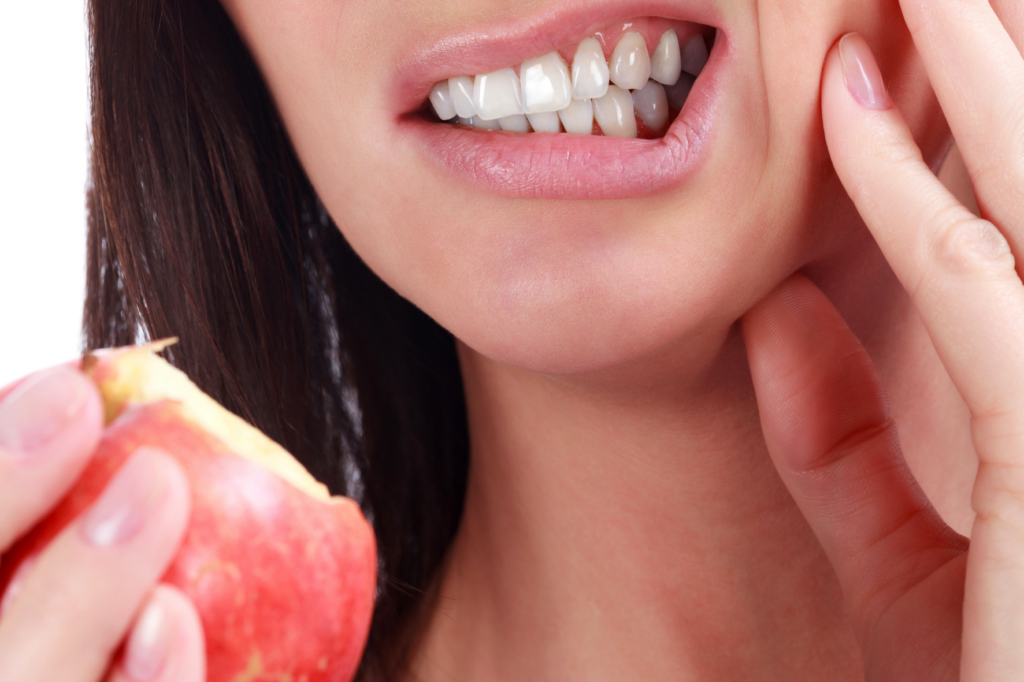At Slater Family Dental, we strive to ensure that all of our patients enjoy the best possible oral health. Aloha, OR family dentist Dr. Slater and his friendly staff appreciate that not everyone knows the best dental practices or what causes some common oral health problems. That’s why we’re committed to providing informative answers to patient inquiries, empowering them with the knowledge to maintain healthy teeth and gums, including effective techniques to address tooth sensitivity
A frequent issue that many patients deal with is sensitive teeth, a condition that causes tooth discomfort in one or more teeth. For most patients, tooth sensitivity is triggered by eating or drinking hot, cold, sweet, or sour foods, and even by breathing in extremely cold air.
The pain caused by sensitive teeth can feel sudden, sharp, and like it shoots all the down into a tooth’s nerve endings.
The Causes of Sensitive Teeth
Tooth sensitivity occurs when the underlying layer of a tooth, known as the dentin, becomes exposed due to the receding of gum tissue. Normally your gum tissue protects your teeth’s root, and enamel, the hardest substance produced in by the body, covers your teeth’s dentin.
However, when the roots of your teeth become exposed, the thousands of tiny tubules that lead to the nerve center of a tooth also become exposed. These dental tubules allow stimuli, such as hot, cold, sweet, or sour, to affect the nerve in a tooth, which causes you to feel pain.
A variety of factors may contribute to the development of sensitive teeth, including:
- Brushing too aggressively. Years of brushing too hard or using a brush with stiff, irritating bristles can eventually wear down the enamel that protects your teeth’s dentin. This causes the dentin, and your teeth’s nerves, to become exposed. Brushing too aggressively can also irritate your gum line, which causes it to recede and expose your teeth’s roots.
- Tooth decay. When located near the gum line, tooth decay can allow bacteria to infect the gum line, which can damage the roots of a tooth and cause sensitivity.
- Gum recession. As previously mentioned, gum recession is one of the leading causes of tooth sensitivity.
- Gum disease. Sore and inflamed gum tissue could cause sensitivity due to the loss of supporting ligaments, which directly exposes a tooth’s nerves and roots.
- Cracked teeth. When a tooth becomes broken, chipped, or cracked, bacteria can enter through these spaces and cause the pulp of a tooth to become inflamed.
- Teeth grinding. Individuals who deal with high levels of stress can begin subconsciously grinding or clenching their teeth, especially at night while asleep. The strain this places on your teeth can eventually wear down tooth enamel and expose the dentin underneath.
- Tooth whitening. Frequent or excessive use of some tooth whitening or bleaching products can cause tooth sensitivity.
- Mouthwash. Certain brands of mouthwash contain high levels of acid that can increase tooth sensitivity if you suffer from exposed dentin. Frequent use of these products can eventually cause damage to the dentin layer of a tooth, which results in tooth sensitivity.
4 Tips to Dealing With Tooth Sensitivity
Fortunately for patients who suffer from sensitive teeth, there are several steps you can take, including:
- Practice good oral hygiene. Brushing and flossing daily will help thoroughly clean your mouth and reduce your risk of developing a number of conditions that can contribute to tooth sensitivity.
- Use a soft brush. The softer a brush you use, the less abrasion will occur to the surface of your teeth and irritation to your gums when brushing. Make sure you brush gently when cleaning the gum line in order to prevent removing gum tissue.
- Use special toothpaste. A variety of brands on the market are designed specifically to help people who suffer from sensitive teeth. Regular use of these types of toothpastes should help to dull tooth sensitivity. However, you may need to try several different brands before you find one that best suits your needs.
- Be careful about what you eat. Try to avoid foods that have a high acid content, as they can cause gradual enamel erosion, which leads to dentin exposure.
If you have any questions about the causes or prevention of tooth sensitivity, make sure you ask Aloha, OR family dentist Dr. Slater during your next visit.


It is our sincere desire that you will feel at home in our office setting. We make every effort to ensure your visits are as comfortable as possible.
We know you wish to receive dental care from a highly trained and caring staff. All new patients are welcome and promise that we will provide the same unwavering quality to your family members and friends as well.




